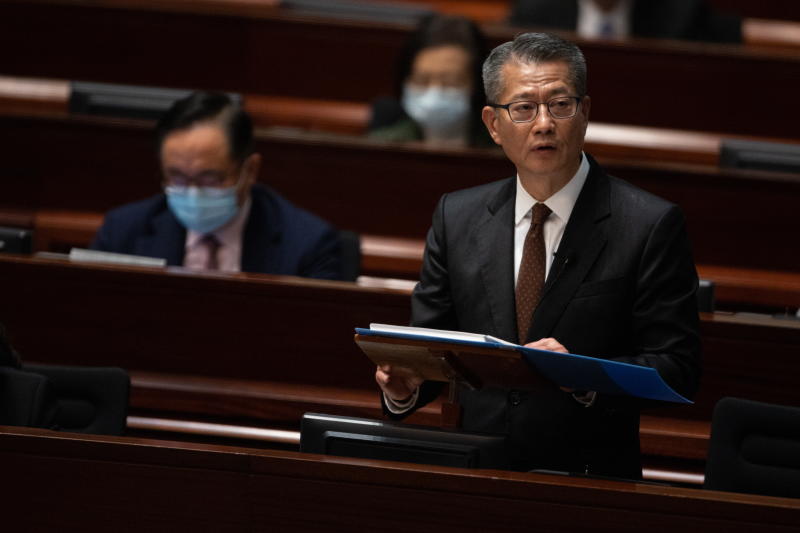Hong Kong finance chief Paul Chan criticised for unfair handouts, police funding
Sign up now: Get ST's newsletters delivered to your inbox

Hong Kong Financial Secretary Paul Chan delivering the budget for fiscal year 2020-2021 at the Legislative Council in Hong Kong, on Feb 26, 2020.
PHOTO: EPA-EFE
Follow topic:
HONG KONG - The city's financial secretary has come under fire by some residents and lawmakers unhappy that the stirring budget would have the police receiving more funding and residents, including those living overseas, getting a HK$10,000 (S$1,800) handout.
During a radio show on Thursday (Feb 27), Financial Secretary Paul Chan sought to explain the rationale for the budget measures for the financial year 2020/21 but instead earned the wrath of some listeners.
He had on Wednesday announced a one-off sweetener that would give HK$10,000 to each Hong Kong permanent resident aged 18 and above to boost domestic consumption and ease financial burdens.
But several callers on Thursday questioned the initiative, saying it is unfair that people who have emigrated are also eligible.
Others, including a female caller who recently moved from the mainland to Hong Kong, felt the "budget has elements of discrimination against new immigrants".
In the budget debate, Democratic Party chairman Wu Chi Wai said it is unfair that Hong Kong permanent residents who are not living in the city will get the cash handout, but not those below 18 who do live here.
Mr Chan defended the move, saying the administrative procedure to identify people would complicate matters.
"It's doable, if I wanted to impose restrictions on who can get the money, but it wouldn't be easy. It would take a long time. I wouldn't be able to give residents the money quickly," he added.
The finance chief noted that it is also inappropriate if everyone, including domestic helpers and foreign students, who live and work in Hong Kong are entitled to the HK$10,000.
The scheme, meant to help seven million people, will cost the government HK$71 billion.
For the first time in 15 years, the government recorded a budget deficit of about HK$37.8 billion for financial year 2019/2020, representing 1.3 per cent of gross domestic product (GDP).
The cash handout is expected to widen the deficit to HK$139.1 billion, or 4.8 per cent of GDP.
Under the measure, overseas Hong Kong residents can apply for the handout online, and do not have to return to the city to get the money. The government aims to allow people to apply for the handout by early July.
During the debate, opposition lawmakers sank their teeth into one particular proposal - additional funding for the police force.
Pan-democrat camp's Ms Claudia Mo accused the government of using the cash handout to deflect criticism of the increased funding for the police.
Lawmaker Charles Mok said the additional funding should be distributed to the people instead.
Some among the opposition lawmakers also wanted the police funding to be treated as a separate item, independent of the budget.
This was denied by Permanent Secretary for Financial Services and the Treasury Alice Lau, who said it is common practice to ask the Legislative Council to approve all funding in one sitting.
The total funding to be allocated to the police is HK$25.8 billion, up 25 per cent from the previous year. The police is expected to add a further 2,500 posts to their 35,000-strong force in the next financial year to "strengthen operational capability".
The city has been struggling with often violent anti-government demonstrations spanning over seven months but the situation has now quietened, largely due to the coronavirus outbreak.
The months of unrest sent Hong Kong's tourism and retail sectors into a tailspin, dragging the economy.
Last year, the economy contracted by 1.2 per cent and this year, the government projected it to shrink by up to 1.5 per cent or grow by up to 0.5 per cent.
On Thursday, the force said its riot police officers will start to return to regular law enforcement duties, such as crime prevention and traffic control, as the violent protests, sparked by an anti-extradition Bill, have faded.
More than 7,000 arrests were made as a result of the unrest, with officers firing nearly 30,000 tear gas canisters and rubber bullets.

